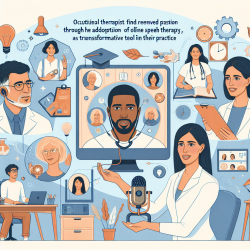Introduction
In the evolving field of laryngology, the importance of research in understanding and treating voice disorders cannot be overstated. The study titled "Voicing an impact: who does the National Institutes of Health support for voice disorder research?" provides a comprehensive analysis of NIH funding trends and their impact on research in voice disorders. This blog post aims to distill the findings of this study to enhance practitioner skills and encourage further research.
Understanding NIH Funding Trends
The National Institutes of Health (NIH) plays a pivotal role in supporting research across various medical fields, including voice disorders. The study analyzed NIH funding from 1989 onwards, revealing that 830 fiscal years of funding supported 232 unique projects related to voice disorders. Otolaryngology departments received the majority of this funding, followed by speech pathology and communication sciences departments.
Interdisciplinary Approach to Voice Disorder Research
The research highlights the interdisciplinary nature of voice disorder studies, with contributions from otolaryngologists, speech pathologists, and PhD researchers. This collaborative approach is crucial, especially in a competitive funding environment. Speech pathologists and otolaryngologists, in particular, have significant roles in both clinical practice and research.
Impact on Practitioner Skills
Practitioners can enhance their skills by understanding the following key insights from the study:
- Collaboration: Encourage interdisciplinary collaboration to enhance research quality and clinical outcomes.
- Research Participation: Actively engage in research projects to contribute to the growing body of knowledge in voice disorders.
- Funding Awareness: Stay informed about funding opportunities and trends to secure resources for impactful research.
Encouraging Further Research
The study underscores the need for continued research in voice disorders, particularly through collaborative efforts. Practitioners are encouraged to pursue interdisciplinary research initiatives, leveraging the strengths of various specialties to advance the field.
Conclusion
Voice disorder research is a dynamic and interdisciplinary field that benefits from the collaborative efforts of otolaryngologists, speech pathologists, and researchers. By understanding NIH funding trends and fostering interdisciplinary collaboration, practitioners can enhance their skills and contribute to meaningful research outcomes.
To read the original research paper, please follow this link: Voicing an impact: who does the National Institutes of Health support for voice disorder research?










